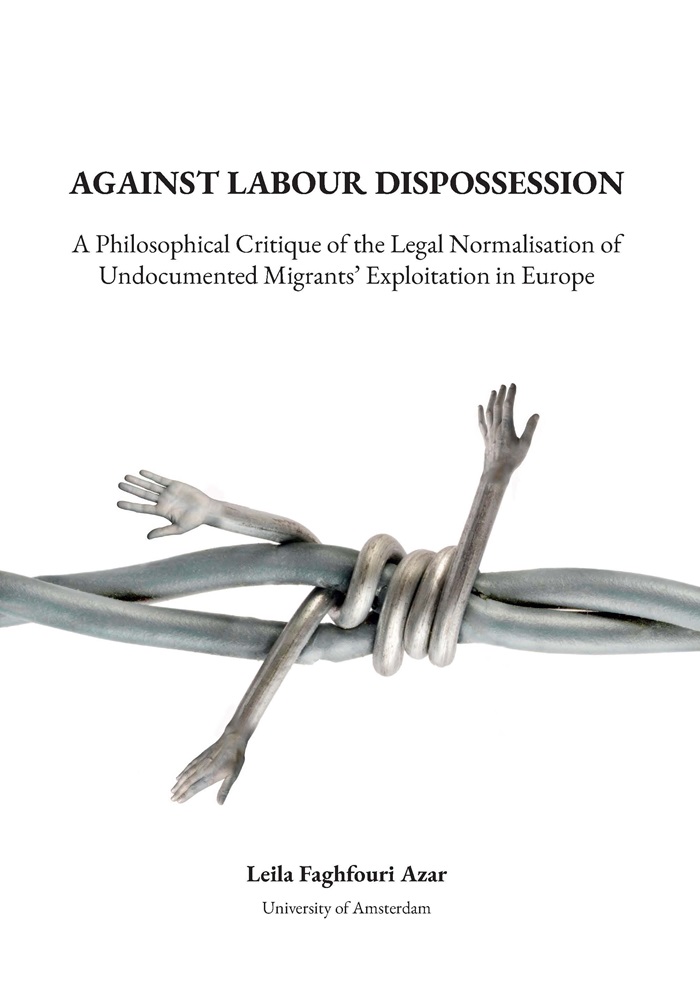
This dissertation of Leila Faghfouri Azar undertakes a legal-philosophical investigation into the role of the European human rights regime in normalising legal structures that expose undocumented migrants to severe exploitation. Combining legal analysis with critical migration theory, it examines the logic and operation of regulations that govern the residence and labour relations of undocumented migrants from both internal and external perspectives. The analysis focuses on the European Union’s Return and Sanctions Directives, alongside a selection of landmark judgments by the European Court of Human Rights (ECtHR) concerning the regularisation of residence status and protection against slavery, servitude, and forced labour.
From the outset, the Faghfouri Azar introduces the term ‘il-legal alien’ as a replacement for ‘undocumented or illegalised migrant’ to highlight the role of law in constructing and perpetuating conditions of illegality and alienage. She situates the analysis of il-legal aliens’ exploitation within the broader context of the political economy of irregular migration under global capitalism and the market’s increasing demand for cheap labour. Drawing on empirical studies, she underscores that il-legal alien workers - who comprise at least 1.1% of the European labour market - form a significant segment of the workforce in sectors such as construction, domestic work, hospitality, and food production. Furthermore, she establishes that despite their essential economic contributions, these individuals are trapped in precarious legal and social conditions. The core analysis of the dissertation demonstrates that prevailing interpretations of European human rights laws reinforce and normalise the exploitability of il-legal aliens. This argument unravels how this legal framework, while ostensibly protective, paradoxically entrenches exploitative conditions. As the author shows, this occurs through the creation of a new category of legal personhood assigned to individuals who lack the legal capacity to establish valid employment relationships. She coins the concept of ‘pseudo-legal personhood’ to describe the condition of il-legal aliens who, by being denied legal standing in employment, are rendered vulnerable to the systematic dispossession of their bodily labour power. This legal logic of dispossession, she argues, mirrors historical regimes of slavery and contradicts the European human rights regime’s professed anti-slavery commitments. Through an analysis of the EU Return and Sanctions Directives and relevant ECtHR jurisprudence, she contends that mechanisms such as the exceptionalism of regularisation pathways and the criminalisation of il-legal aliens’ employment reinforce, rather than alleviate, their exploitation. She thus concludes that the European human rights framework operates within and sustains a broader political economy which relies on and benefit from the exploitation of cheap, disposable labour under global capitalism. In the final chapter, the dissertation returns to the human rights framework to explore its potential in disrupting this cycle of exploitation. She argues that disentangling the right to work of il-legal aliens from their residence status, under the European human rights regime’s promise of absolute prohibition of slavery, is central to resisting this structural exploitation. Here, she advocates for the unionisation of il-legal alien workers as a form of collective resistance capable of challenging the systemic denial of their right to work, which effectively dispossesses them of the ability to control and benefit from their labour to secure livelihood and means of subsistence. The author envisions a liberatory path forward through the unionisation of il-legal alien workers to claim the right to work independent of their residence status. This, she concludes, is an essential minimum that post-slavery Europe – which continues to rely on il-legal aliens’ labour owes to them.
Faghfouri Azar defended her thesis on April 3th, 2025, at the University of Amsterdam, Faculty of Law. Supervisor: prof. Marc de Wilde, co-supervisor: dr. Bas Schotel.
Leila Faghfouri Azar
Against Labour Dispossession: A Philosophical Critiuqe of the Legal Normalisation of Undocumented Migrants’ Exploitation in Europe
This dissertation is available at the repository of the university of Amsterdam.
ISBN 978 94 6510 482 9

